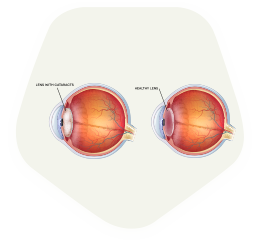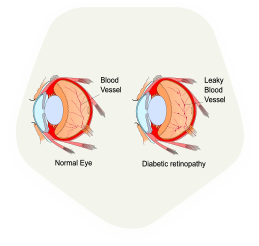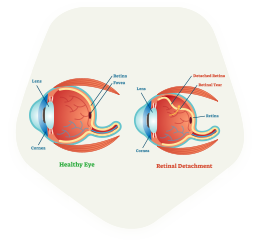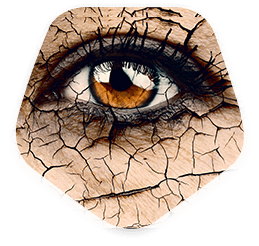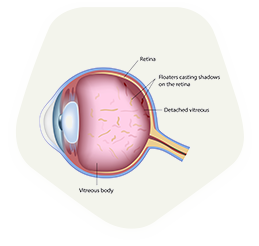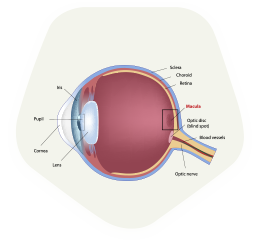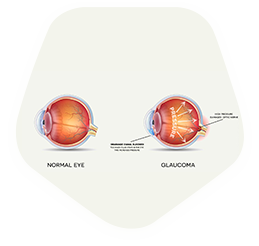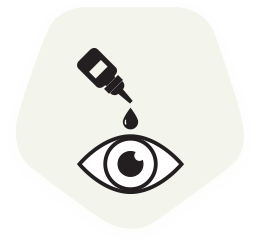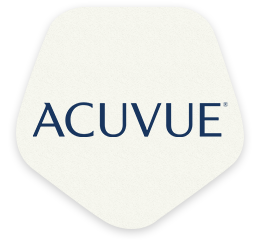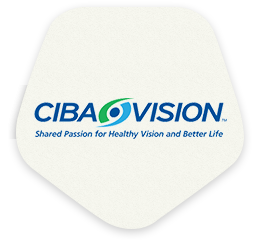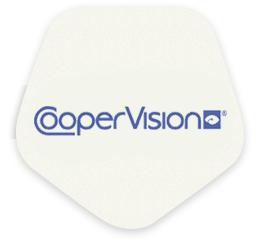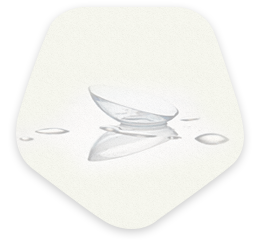Eyeglasses
Sunglasses
Contact lenses
LASIK
Eyeglasses
Q: I see fine, so why do I need to see an eye doctor?
A: Regular eye exams are the only way to catch “silent” diseases such as diabetes, glaucoma and other conditions in their early stages, when they’re more easily managed or treated. Many conditions can be discovered in a carefully planned eye exam. Those who consider mass-produced, over-the-counter reading glasses are truly doing themselves a disservice, both financially and medically.
Q: Do I need an optometrist or an ophthalmologist?
A: Both are eye doctors who diagnose and treat many of the same eye conditions. The main difference between the two is that ophthalmologists perform surgery and optometrists do not, preferring to specialize in eye exams as well as eyeglasses- and contact lens-related services.
Q: How do I know if I need bifocals?
A: The most common use of bifocals is for treatment of presbyopia in individuals aged 40 and over. Whether or not a person has needed vision correction when younger, by the early to mid-40s, the ability to accommodate or focus the eyes has diminished.
Q: What’s the secret to getting glasses that look great on me?
A: We are fortunate to be staffed with fashion experts. They not only will assist you in your desire to get the “look” that is most flattering to your features and taste, but they will ensure that your new fashionable eyewear will function nicely with your needs and lifestyle, as well. This is easier said than done. That is why we have a very knowledgeable staff dedicated specifically with you in mind.
Q: How often should I get a new pair of glasses?
A: This is a personal concern that can address many issues. You should change your eyeglasses when you feel that your existing eyeglasses no longer are supporting your needs, lifestyle or taste.
Q: Why are my lenses so thick?
A: Your prescription, your personal measurements and the size of your frame are the three key factors that will determine final lens thickness. If you are farsighted, your lenses will be thicker at their center; in contrast, if you are nearsighted, your lenses will be thicker at their edges.
Q: Can the thick lenses be made thinner?
A: Absolutely! Newer, thinner lens materials are being developed all the time, and we pride ourselves on constantly being up-to-date with the latest developments and materials in the optical community. This, along with the proper grinding and appropriate frame selection, could make your new fashion eyeglasses distinctly thinner. Ask one of our doctors or staff about the newest innovations in lenses today.
Q: Do regular glasses protect my eyes from the sun?
A: Plastic lenses do not protect your eyes. You need to have protection from UV rays, which is not inherent in a plastic lens. You can have a UV protective coating applied to a plastic lens, but polycarbonate lenses have built-in UV protection. Glass lenses protect your eyes from harmful UVB rays but not from UVA. Some experts think UVA rays might have long-term, damaging effects to your eyes and skin.
Q: How can I stop glare at night or at a computer?
A: There can be many causes for this condition. However, many times this problem can be alleviated, or even dismissed, with the use of AR (anti-reflective) lenses. First and foremost, however, annual or semi-annual eye exams are the ONLY avenue to your eye health and the ONLY resource to ascertain the correct reason or cause for any eye ailment! That being said, and once any medical or physical condition is removed as a possibility of cause, then the perfect solution for glare on computer screens or glare from night driving would be AR lenses.
Sunglasses
Q: Do sunglasses really help to keep my eyes healthy?
A: We cannot stress this enough: YES! You know how the sun’s UV rays can harm your skin – wrinkles, premature aging and skin cancer are some of the dangers of unprotected sun exposure. The same rays that age and damage your skin can and will hurt your eyes, as well. Strong sunlight and artificial light from sources like welding arcs or tanning lamps can burn the surface of the eye, much like sunburn on the skin.
Q: Are the lenses that change colors OK for sunglasses?
A: There are popular lenses in plastics that are called Transitions® lenses. When they’re exposed to ultraviolet light, they become darker or change to a different color. However, most brands are not as effective in a car or in any vehicle with the blue or gray stripe on the windshield. Because of the ultraviolet-blocking nature of the windshields, lenses will remain pretty light when you’re driving. The ultimate sunglasses experience can be enjoyed with polarized sunglasses, as these lenses offer the most protection and comfort to the eye so strain and fatigue can become a thing of the past. Transitions is a registered trademark of Transitions Optical, Inc.
Q: What are ultraviolet (UV) light and infrared (IR) light?
A: Ultraviolet light (UV) is an invisible light that is part of the sun’s radiant spectrum. Exposure to UV light can cause the lenses of the eye to become cloudy, causing cataracts among many other conditions. UV light causes the eye to age faster, thus can also cause macular degeneration. You can’t see UV light. It affects the eye without your awareness of its being there, and the effects are cumulative. Not all sunglass lenses block all of the UV light, but the lens we recommend most is a polarized sunglass lens for sunglasses and polycarbonate lenses for dress wear. Infrared (IR) is an invisible electromagnetic radiation that has a longer wavelength than visible light and is detected most often by its heating effect. Part of the discomfort you feel in your eyes after being out in the sun for a while is caused by IR light. Not all sunglass lenses block all of the IR light, but the lens we recommend most is a polarized sunglass lens for sunglasses and polycarbonate lenses for dress wear.
Q: Can sunglasses help night vision?
A: If your eyes are subjected to intense glare during the day, they will “defend themselves” by trying to adapt. This natural built-in defense mechanism will persist for several hours after the glare is removed, resulting in reduced vision. Studies show that night vision can be reduced by as much as 50% by this exposure. Wearing sunglasses during the day dramatically improves night vision.
Contact Lenses
Q: Can I wear contact lenses?
A: With the newest contact lens designs and materials available today, our doctors are able to fit patients who may not have had success wearing contact lenses in the past. Whether due to poor vision, astigmatism, comfort issues or dry eyes, there are many more choices in contact lens materials to meet those challenges.
Q: What types of contacts lenses are right for me?
A: There are several types of contact lenses, but only a thorough examination of your eyes and your lifestyle will reveal the answer.
Q: What’s involved in a contact lens exam?
A: In an initial exam, the eye doctor will examine your eyes to determine if you can wear contact lenses. Your prescription and the curvature of your eye are measured and the doctor will discuss any special needs you may have. The doctor will then determine the type of contact lenses that best fit your eyes and provide you with the most accurate vision while ensuring that your eyes remain healthy with the lenses.
Q: What’s involved in a contact lens fitting?
A: When the lenses are ready, a fitting examination is scheduled as a practice session for you to try your new lenses and to become adept at lens insertion and removal. The doctor will also look at the lenses on your eyes and determine if any changes need to be made.
Q: Can I swim or shower with contact lenses in?
A: There are two main reasons why you should not swim or shower with your contact lenses – possible loss of the lenses and, most importantly, contamination of the lenses. Under water, contact lenses may be washed out of your eye, or above water a small wave or splash may take the lens with it. Contact lenses, especially the soft variety, will absorb any chemicals or germs in the water. They will then stay in or on the lens for several hours, irritating the eyes and possibly causing infection.
Q: What is the difference between soft and hard contact lenses?
A: “Hard” lenses were the original contact lenses made several decades ago from a plastic called PMMA. For a long time, they were the only kind of lens, but they are seldom used anymore. “Soft” lenses are slightly larger and more flexible than rigid or hard lenses. Soft lenses are made of materials that soak up water, and it is this uptake of water that allows oxygen to transfer to the cornea. Soft lens material itself is impermeable, so oxygen is transmitted via the water.
Q: What if I don’t wear my two-week disposable contacts every day?
A: The two-weeks timeframe refers to 14 days of wear. If you are wearing lenses only two to three days per week, the lenses may last longer than two weeks.
Q: Can I safely wear extended-wear contact lenses overnight?
A: Extended lens wearers may have an increased risk for corneal infections and corneal ulcers, primarily due to poor care and cleaning of the lenses, tear film instability and bacterial stagnation. Corneal neovascularization has historically been a common complication of extended lens wear, though this does not appear to be a problem with silicone hydrogel extended-wear lenses. The most common complication of extended lens use is conjunctivitis, usually allergic or giant papillary conjunctivitis (GPC), sometimes associated with a poorly fitting contact lens.
LASIK
Q: Am I a good candidate for laser vision correction?
A: By having a consultation and eye examination at our office, our doctor will be able to determine if you are a good candidate for laser vision correction. Patients who are at least 18 years of age and have healthy eyes that are free from retinal problems, corneal scars and any eye diseases are generally suitable. We will also discuss your lifestyle needs to help you decide if LASIK is the best alternative for you.
Q: How long does the surgery take?
A: The entire procedure takes approximately 15 minutes for both eyes and about five to seven minutes per eye.
Q: What type of anesthesia is used during the surgery?
A: Topical numbing eyedrops are used during your procedure. Sometimes an oral medication is offered to help you relax. We do not use any needles during your surgery.
Q: Does LASIK hurt?
A: The treatment itself is painless. We will place a few numbing drops in your eye(s) to make you more comfortable. You will feel pressure on and around the eye during the procedure. Some patients may experience a feeling of “something in the eye” for a day or two after treatment.
Q: Will I still need eyeglasses or contact lenses?
A: The goal of refractive surgery is to reduce your dependence on eyeglasses or contact lenses. An occasional patient may need to wear a thin pair of prescription eyeglasses for driving at night.
We welcome patients from Boston, Danvers, Lynn, Marblehead, North Shore Boston, Peabody, Salem and Swampscott. We provide the following “best eyeglass store” products and services:
- Designer glasses and eyeglass frames
- Men’s eyeglass frames
- Eyeglass frames for women
- Prescription eyeglasses
- Prescription sunglasses
- Polarized sunglasses
- Transitions lenses
- Men’s sunglasses
- Sunglasses for women
- Designer sunglasses
- Progressive lenses
- Vintage eyewear
- Contact lenses
- Soft contact lenses
- EyeMed Vision Care and VSP vision plans
- VSP eye doctor
At Banville Optical, we can help you with your eye health condition. Call us at (978) 745-2774 or fill out our online Request an Appointment form to schedule a free consultation with our resident optician Richard Rizkalla, RDO, NCLC.



